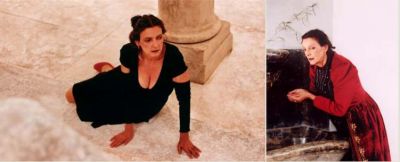Barbara Frischmuths play, RABENMUTTER | ||||
| September 3rd/20:30 hrs | ||||
Concept I. A. M. Horn/Michael A. Richter Production I. A. M. Horn/Michael A. Richter Wardrobe and set design Claudia Zegers Lighting architecture Costa Assistant producer Eva Steindorfer Music from "VIA CRUCIS" by Franz List We should like to thank Art for Art Vienna / Annette Beaufays, Schauspielhaus Graz / Matthias Fontheim, and Pastor Hermann Glettler, for their cooperation and support.
Rabenmutter is a mono play that was first published by Residenzverlag (Mörderische Märchen / Murderous Fairytales: short stories) and that was broadcast as a TV film by ORF, in 1991 (director: Christian Berger).
Maria reflects on the process of letting go into their own worlds, what is close and well-known, well-formed, well-loved, she reflects on the importance of love, respect, responsibility and the principle of life, by way of laying hands on nature and forming it – forming and nurturing her foundling / the raven. A tale of suffering, full of resistance and doubt, begins to unfold; there is the need for painful subordination and the recognition of the limits to human power; renunciation as part of a process (decreed by nature) of cutting the umbilical cord; of maturation, in her own time. The last of her stations of the cross leads her back to an active life, fortified by the fuller knowledge of her identity: though her calvary, her passion is by no means over. Yet her strength has returned, she faces life and its demands, and hopes she will be wiser this time. No matter if she tries for the nth time to trick and outplay the FATHER OF ALL THINGS, for the sake of her loved ones: in spite of the many failures that have gone before, she has not given up all hope. Frischmuth ´s MOTHER RAVEN in the Dominikus Chapel at Graz In the very heart of Gries, the multicultural district of Graz, a new prayer centre is rising from the stones of a monastery that no longer exists, in this old faubourg called Murvorstadt, with the Chapter Hall (Kapitelsaal) for its centre. For the time being, however, the vaults of the Dominican Chapel that still smell of fresh paint, witness theatre being played: between carefully restored relics of old features, and remarkable examples of new furnishings, the actress Anna Maria Gruber (born and bred in Graz) unfolds RABENMUTTER, Barbara Frischmuth s mono-drama, co-operation between kunstGarten and AndrÄ-Kunst. The venue is well chosen. Frischmuth s monologue (filmed as early as 1991) is a piece of promethean protest at the fatherly, male principle; at the same time, it enacts the stations of the cross, full of complex references to Christian religion and to Germanic myths. Michael A. Richter, director/producer, uses all available space to show the fourteen stations or stages of a mother s farewell to her son; he makes the most of the liturgical objects and spare props to enhance changing moods. (A feature we could have done without is the cage in which the son / raven sits – well, well.) What is a son? Something weak, continually dreaming of its strength, Once more, Anna Maria Gruber impresses with a powerful text by Barbara Frischmuth that she masters intelligently. Gruber casts a spell over her audience, lending her distinctive presence to clear-sighted grief; rage; love; solidarity, those elements of feminist literature that have meanwhile been canonized. Carefully, she gives meaning to every word; as the raven s mother (the beastly mother of this pun), she throws off the décor of tradition, to the point of vulnerable nakedness. She rages, preaches, bargains, smiles, falls; gives notice that all pacts are ended; and has sufficient strength to get involved anew. Neue Kronen-Zeitung, 5-9-2004 A mother s torments of hell B. Frischmuth in Graz Power, subjugation and motherly powerlessness are what RABENMUTTER is all about: Barbara Frischmuth s closely-written monologue that is full of deep dispair was given its world premiere at Dominikuskapelle in Graz. Progressing through the brutal 14 stations of the cross, and through as many memorable scenes, Anna Maria Gruber, the attractive actress, suffers all the pains and grief that a mother can suffer. In her impulsive monologising, she throws herself into existential chasms that appear without a way out: she laments the absence of a father – his physical absence, as well as the absence of the divine – and almost breaks up when she is to release her child, let her son go his way. A common raven stands for son, man and god (in general terms): she takes the raven back to a mountain on which she found it / him. Michael A. Richter (director/producer) clearly marks each scene off from the rest, by means of idiosyncratic effects of lighting; as a godlike raven, he sits naked in a golden cage – which produces a strong impression in the sacred ambience of the Dominikuskapelle. (T. Schweighofer)
| ||||
